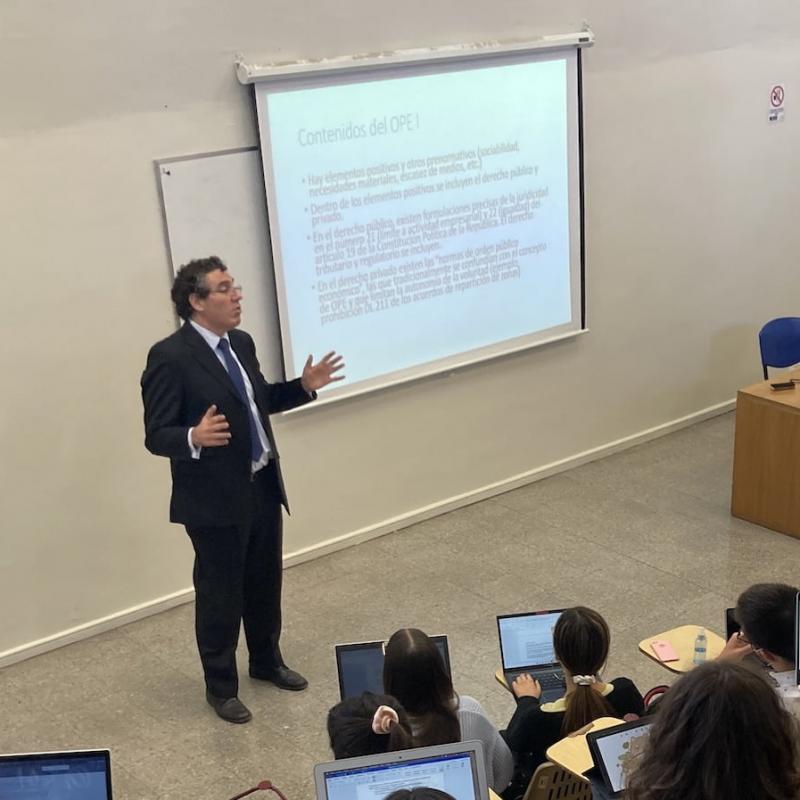Breadcrumb
Rafael Pastor (MPP 2014) joined the Blavatnik School of Government’s Master of Public Policy (MPP) when he’d reached a mid-point in his career.
A lawyer by training, with extensive experience in law across the private and public sectors as well as academia in Chile, Rafael had a longstanding interest in public policy and public management reform. This interest developed further when he undertook a master’s in development at Victoria University in New Zealand.
“New Zealand was a trailblazer in reforming its public sector during the 1980s. They used a economic rational approach to analysing their bureaucracy and modernising the state. I had an Argentine roommate during my master’s and we spent many evenings discussing how the example set by New Zealand could be applied to Latin America, where politics still has a huge influence over the civil service in many countries including Chile.”
Some years after his return from New Zealand, he was offered the position of Chief of Staff to the Undersecretary of the Ministry of Justice. In this role, he was the third highest authority within the ministry, working on policy issues relating to the administration of prisons and youth courts, managing work relations with Chile’s public defenders’ office, enacting justice sector reforms and managing the ministry’s negotiations with the public workers’ union – an extremely powerful body in the country. The challenges of this role led him to think more deeply about the skills he wanted to add to his existing experience to continue serving his country.
“The role at the ministry had a fixed end date and I began to think about taking another year off and studying policy in-depth. The Blavatnik School was only three years old at the time so it felt like an exciting time to join and Oxford had always appealed to me as an institution of excellence. But I was 41 at the time and felt sure I wouldn’t be able to get a scholarship. When I found about the Chevening Scholarship I was excited to discover that there was no age limit and so I applied for the scholarship and the MPP.”
Though he was appointed as a judge of the Patent and Trademark Appeals Court by the former President of Chile Sebastián Piñera, he decided to continue with his plans to pursue the MPP. He therefore joined the court for six months prior to starting the course and would return after.
During his time at the School, Rafael juggled family life with his wife and three young children, his courses and working part-time as a domain name conflict resolution arbitrator, a challenging but rewarding experience they look back on fondly as a family. At the School, the courses on economics were particularly impactful, and he continues to apply to his work years later.
“You can’t make people economists in one term. But the Blavatnik School takes the key issues that any professional working in public policy matters needs to know, guides you towards these subjects and then encourages you to look further into it yourself once you have the tools and basic knowledge you need to do so. Now I’m sitting at the bench I’m using all these frameworks and concepts.”
After returning to the Patent and Trademark Appeals Court as president, Rafael later became director of the Universidad Central, Chile’s law school, where he now also manages degrees in social work. Alongside this, he teaches courses on policy implementation and public management and state reform at the Universidad Católica de Chile, and acts as a substitute judge on at Chile’s Antitrust Commission – the court that rules competition cases.
“In my view competition policy is essential. Nowadays there is so much concentration of market power in hands of few, along with emerging digital markets in which the frontiers between what is political and what is exclusively economic are becoming more blurred. Big tech can and does intervene and affect people’s perceptions of politics.”
Rafael is a passionate follower of Chile’s politics but has no plans to enter electoral politics himself any time soon. State reform remains a longstanding interest, and is particularly relevant to this moment in Chile’s history. With researchers at the law school he directs overseeing aspects of the rewriting of Chile’s constitution, Rafael is hopeful that the new document incorporates the checks and balances necessary for a flourishing democracy where power is not concentrated in a particular branch of government.
Rafael was a Chevening Scholar.
June 2022.

